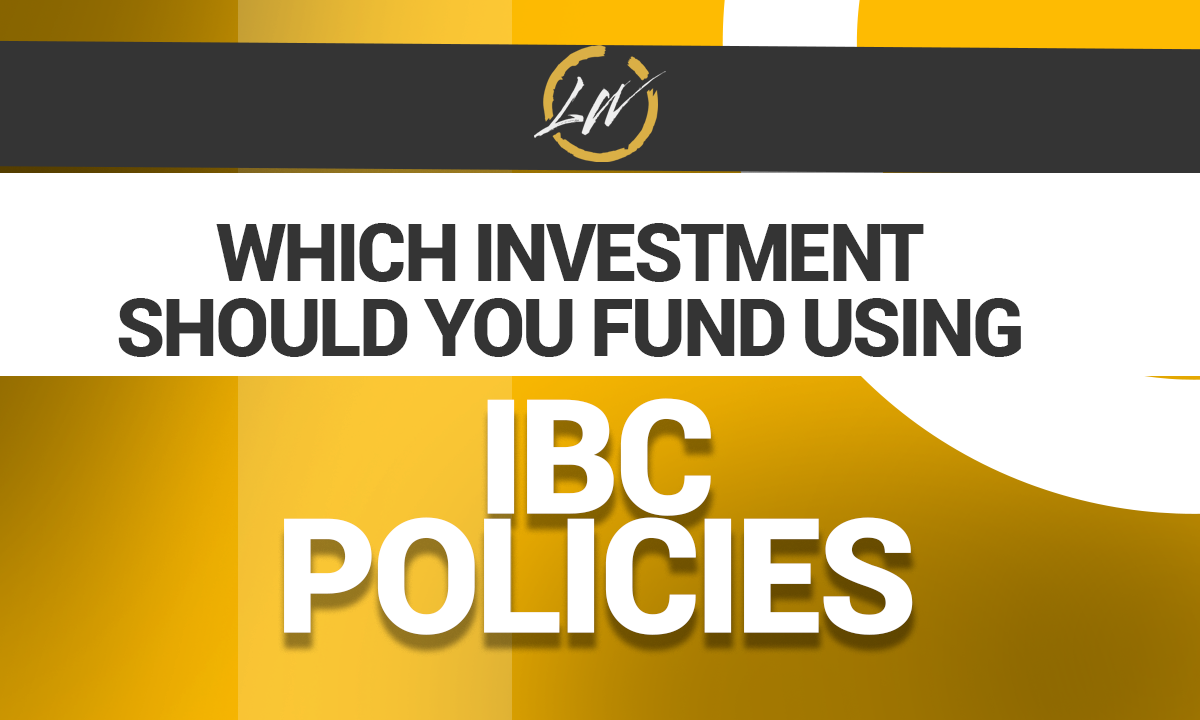Today, we’re looking at how an IBC insurance policy can be used to maximize investments, providing insights into which types of investments align best with this strategy and which ones may not be suitable.
Whether you’re a seasoned investor looking to enhance your portfolio or someone new to the world of IBC seeking innovative wealth-building techniques, this guide will offer valuable insights and practical tips for leveraging Infinite Banking and dividend-paying whole life insurance policies to achieve your investment goals.
Leveraging IBC Policies to Fund Investments
One of the most compelling things about Infinite Banking is its capacity to serve as a funding source for various investments.
When considering which types of investments align well with Infinite Banking Concept (IBC) policies, it’s important to focus on ventures that generate consistent cash flow.
Unlike traditional investments that may rely solely on capital appreciation over time, IBC thrives when paired with assets that produce ongoing income streams. Investments that offer predictable cash flow not only facilitate the repayment of policy loans but also enable the recycling of capital, creating a self-sustaining cycle of wealth accumulation.
Among the investment options available, certain asset classes stand out as particularly compatible with IBC strategies.
Real estate investments, for instance, have long been favored by Infinite Banking experts due to their potential for generating rental income. By using policy loans to finance real estate acquisitions, individuals can leverage their insurance policies to acquire income-producing properties, thereby enhancing their cash flow and expanding their wealth portfolios.
Private lending also presents another attractive option for IBC-funded investments. Whether through peer-to-peer lending platforms or direct loans to businesses or individuals, private lending offers the opportunity to earn interest income on deployed capital. By leveraging IBC policies to extend loans, people can effectively become their own banks, capturing the interest payments as additional cash flow to fuel further investments or policy growth.
To understand better how cash flow-producing investments and Infinite Banking work together, here are some examples:
Real Estate Acquisition: A person uses a policy loan from their Infinite Banking policy to purchase a rental property. The rental income generated from tenants is directed back into the policy, replenishing the cash value and enabling future investments or policy enhancements.
Private Lending Venture: Through their Infinite Banking policy, an individual extends a loan to a small business seeking capital for expansion. Using policy loans to fund business expansion projects can be a strategic move for entrepreneurs.
Whether it’s investing in new equipment, expanding operations, or launching a new product line, utilizing IBC policies provides access to capital without the need for traditional bank financing. The interest earned on the loan is reinvested within the policy, compounding the growth over time and positioning the individual as a key player in the entrepreneurial landscape.
Investments to Avoid with IBC
While dividend-paying whole life insurance policies are a versatile tool for wealth accumulation and investment funding, not all investment ventures align well with this financial strategy. It’s important to recognize which types of investments may not be suitable for funding through an IBC insurance policy to make informed decisions about wealth management.
Investments that don’t work well with IBC include retirement programs, such as 401(k) plans and IRAs, as well as traditional stock market investments. Unlike cash flow-producing assets that thrive within an Infinite Banking framework, these passive investments rely primarily on capital appreciation over extended periods, making them less compatible with the principles of IBC.
Retirement programs, such as employer-sponsored 401(k) plans and individual retirement accounts (IRAs), are designed to provide individuals with a vehicle for long-term savings and wealth accumulation.
Similarly, stock market investments involve purchasing equities or funds with the expectation of capital appreciation over time. While these investments can offer opportunities for wealth growth, they often lack the consistent cash flow generation that optimally complements Infinite Banking strategies.
The core principle of Infinite Banking revolves around leveraging specially designed whole life insurance policies to generate cash flow and enhance financial flexibility. Without the ability to generate consistent cash flow to repay policy loans and replenish policy values, funding these investments through IBC insurance policies may result in very low ROI.
How to Implement IBC Strategically
Implementing the Infinite Banking Concept needs careful consideration of individual financial goals, risk tolerance, and investment preferences.
Whether your objective is wealth accumulation, retirement planning, debt reduction, or legacy building, IBC can be tailored to suit diverse financial objectives. Understanding how IBC aligns with specific goals enables you to tailor their policies and investment decisions accordingly.
The Spectrum of IBC Involvement
IBC offers four stages of involvement, ranging from minimal use to full-scale integration into one’s financial strategy. Some individuals may choose to utilize IBC primarily for savings and liquidity purposes, while others may opt for comprehensive integration, leveraging policies to fund a wide range of investments and expenses. Recognizing where you fall on this spectrum is essential for determining the most suitable approach to implement IBC.
Recommendations to Determine Your Involvement
To determine your level of IBC involvement, you need to evaluate your investment objectives, risk tolerance, and cash flow needs.
For those prioritizing cash flow-driven investments, such as real estate or business expansion, you might want to consider a higher level of IBC involvement to facilitate funding and capitalize on the strategy’s benefits. While people with a preference for long-term passive investments may find minimal IBC involvement sufficient, focusing instead on traditional investment vehicles like retirement accounts and stocks.
Practical Tips for Maximizing IBC Investments
Effectively managing dividend-paying whole life insurance policies is crucial for maximizing investment returns and achieving financial goals. Here are some practical tips for optimizing IBC investments:
- Policy Management: Regularly review and monitor the performance of your IBC insurance policies to ensure they are meeting your financial objectives. Stay informed about policy updates, dividends, and loan provisions to make informed decisions.
- Structuring Policies: Work with a knowledgeable advisor to structure your IBC policies for optimal cash value accumulation and loan utilization. Customize policy features such as base premium, paid-up additions, and riders to align with your investment goals and risk tolerance.
- Loan Utilization Strategies: Develop strategies for leveraging policy loans effectively to fund investments while preserving cash value growth. Consider the impact of loan interest rates, repayment schedules, and potential investment returns when determining loan utilization.
- Risk Management: Maintain a balanced approach to risk management within your IBC investment portfolio. Diversify investments across asset classes and industries to mitigate risk and enhance long-term returns. Reassess your investment strategy to adapt to changing market conditions and financial goals.
In conclusion, Infinite Banking offers a powerful wealth-building strategy that can be customized to align with individual financial goals and preferences. By leveraging IBC policies to fund investments that produce cash flow and strategically managing policy loans, you can enhance wealth accumulation and financial security over time.
As you explore the possibilities of Infinite Banking, it’s important to seek personalized advice from qualified professionals and continue educating yourself about IBC strategies. Take advantage of free educational resources, courses, and workshops to deepen your understanding and implementation of Infinite Banking concepts.
Our free infinite banking course is the best and simplest course to become an expert on IBC, you can take the course at livingwealth.com/escapethebank.
Empower yourself to take control of your financial future with Infinite Banking, and discover the freedom and flexibility it offers for wealth creation and legacy building. Start your journey toward financial freedom today!






